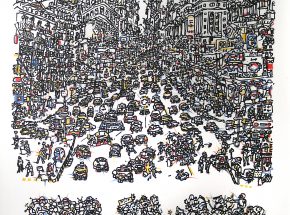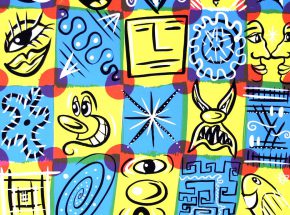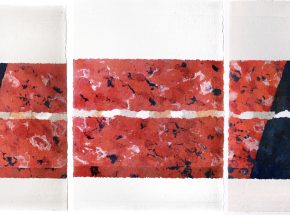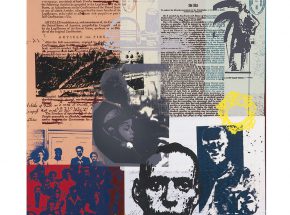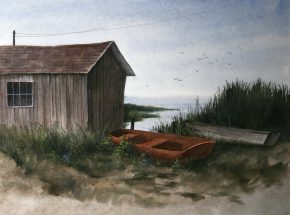

“My style is deeply personal, navigating between geometric abstraction, landscape and architectural motifs, light and calligraphic images.”
Nancy Genn’s work reflect her own sharp and appreciative eye for detail in both natural and architectural settings. Shape, texture, line, light and color are all balanced and considered not as merely descriptive flourishes, but as essential, striking forces themselves.The works cohere at a point between abstraction and representation — the titles evoke a sense of place rather than specify its absolute parameters, the pieces, which may include calligraphy, pencils marks, bits of an architect’s topographical map and Persian script, allude to a narrative while refusing to tell only one tale. Her abstraction provoke visceral responses — they are reminiscent of landscapes, seascapes or cityscapes, but reach for something beyond a facade or blue horizon. The active visual fields draw the viewer in, allowing us to become part of her experience, as the experience simultaneously becomes our own.
Once again, it seems to be her mother’s early impact that nurtured Genn’s resonating abstract style. Genn owns the notebooks of the Japanese master Hokusai, which her mother purchased in 1917, and feels that his sketchbooks in pen and ink have been an influence on the line and structure of my paintings.” Asian art was “part of the household”, the artist recalls. Throughout her career, which now spans almost five decades, Genn has pursued this early connection with Eastern forms and thought. Although she feels that her mode of geometric abstraction is more widely practiced and accepted on the East coast of the United States, her life long location in California has been a vital source for her art. “I am interested in the realm of ideas — that is why we like Berkeley and the San Francisco Bay area. Here we are on the cutting hedge of thought. We are on the Pacific Rim. There is a link between Western ideas and Asian thought here”.
Her travels throughout all of Asia, as well as to Italy, Greece and Turkey, have profoundly affected her work. The artist gained international recognition in the 1970’s for her experiments with hand made paper. Using what is now known as the “Genn method”, she created three-dimensional abstract works. Not only did she revitalize an ancient Japanese art form but she revitalizes the medium of paper itself. “Paper is an old material but here I have used it in a totally different way”, she says. The resulting works of art unite not only East and West, but the artist’s own experience as both painter and sculptor.
Genn’s more recent works still subtly plays with the three-dimensionality of paper on canvas and the three-dimensionality of sculpture. She may had layers of monotype or printed papers collected from her exotic travels, as if creating a new sense of place rich with personal significance from the literal scraps of ancient destinations. Memories are not as much catalogued or reported as they are created, emerging from the deep colors she found in Rome, the haunting luminosity she discovered in Turkey’s Lycian shore, or the powerful, solitary ruins she encountered rising up from the desert of Yemen. “I enjoy the possibilities for subtle change; it allows for the thorough explanation of an idea”. Genn’s work seems constantly fluid and changing, beckoning the viewer’s eye to move with it into a delicate tapestry of form, texture and memory.
Image courtesy of Nancy Genn, self-portrait
Website
http://www.nancygenn.com
